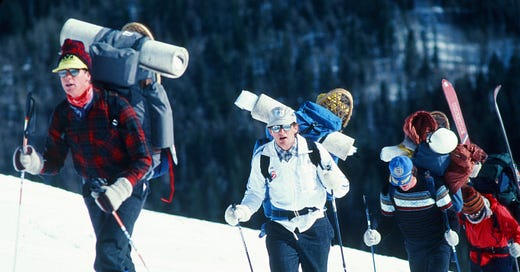In 1982, the USA men’s national volleyball team was struggling. At the World Championships in Argentina that year, the team finished 13th. In one particularly forgettable match, the Americans were up 12-5, just three points away from a victory that would advance them into the medal round, yet they choked, eventually falling 16-14 to Bulgaria. With less than 2 years remaining until the Olympics in Los Angeles, something had to change. The coaches, along with two sports psychologists, one of whom was my father, decided a “shared significant life experience,” would bring the team together and build resilience.
Early on the morning of January 7, 1983, the national team, consisting of 15 players, 3 coaches and a sport psychologist, boarded a bus in Grand Junction, CO for the three-hour trip to Monticello, UT, where Outward Bound maintained a year-round base camp. After a brief stop to pick up equipment and rations, the bus drove the team west out of Monticello toward the snow-covered Abajo Mountains. Abruptly, the highway reached a point where it was not plowed and the bus rolled to a stop, the way blocked by thirty-seven inches of snow. The snowpack in the Abajo Mountains was 151 percent of normal that winter.
From left to right, US national volleyball team players Pat Powers, Steve Timmons, Jon Roberts and Outward Bound instructor Peter O’Neil with skis on his pack, ascending a slope in the Abajo mountains, January 1983. Photo Credit: Bruce McAllister
Two Outward Bound instructors who would be joining the group were waiting in ambush. As the players got off the bus, the instructors welcomed the players Outward Bound– style—pelting them with snowballs. It set the tone that, yes, it was a serious trip, but there would be some fun along the way too.
As the players shuffled off the bus, dodging snowballs, local snowmobilers moving through the area did a double take, struck by the size and height of the men.
One of the first things the instructors asked the players to do was empty their pockets and personal packs. The athletes had been told what to bring and what not to. Rolls of toilet paper fell to the frozen ground. It was not on the list. “Whatever you pack in, you have to pack out, and you definitely don’t want to pack that out,” said the instructors.
“What are we going to use?” the players asked.
“Snow,” the instructors responded.
The look on their faces said it all.
“But what if there isn’t any snow?” the players asked with a hint of
desperation.
“Sagebrush,” said one of the instructors with a playful smile on his face. Only he wasn’t kidding. California seemed very far away.
The players were issued everything needed to survive the extreme cold, including down parkas, packs, snowshoes, tents, extra-large sleeping bags with liners, Sorel boots, and all the food they would need for the next eight days, until they reached a resupply point.
Equipment and food were divided among the players and coaches and packed into backpacks, “estimated 70 pounds at the beginning of the day, re-estimated 170 pounds at the end of the day,” assistant coach Bill Neville quipped.
A snowmobile path led fortuitously uphill from the staging area at 8,200 feet elevation, and the players and coaches trudged their way up the track westward, into the heart of the Abajo Mountains. They were leaving civilization behind and stepping into the wild, where teamwork would be essential for survival.
My book, If Gold Is Our Destiny, releases in three weeks. Please join me for the virtual launch party on Wednesday July 13th at 10am PT / 1pm ET. Joining me from the 1984 gold medal winning USA volleyball team will be head coach Doug Beal, assistant coach, Bill Neville and player Aldis Berzins.
Register here.
Sean Murray is the founder of RealTime Performance, a leadership development firm based in Seattle, WA, and the author of If Gold Is Our Destiny: How a Team of Mavericks Came Together for Olympic Glory.
LinkedIn | Twitter | Facebook | Pre-Order If Gold Is Our Destiny





